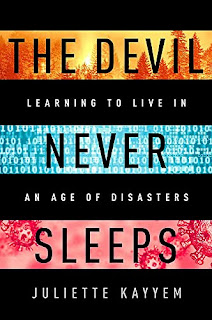I think I concluded "no." That exercise is not necessary.
This could have been a fascinating book. Kayyem knows whereof she speaks. According to her Wikipedia biography, she "was the Assistant Secretary for Intergovernmental Affairs in the United States Department of Homeland Security, in the Obama administration. ... Prior to her federal position, she was Massachusetts' first Undersecretary for Homeland Security, where she was responsible for developing statewide policy on homeland security, with a focus on preventing, protecting, responding to, and recovering from critical incidents." In that job, she oversaw the preparations for a terrorist attack on the Boston Marathon, and properly can take credit for the amazing fact that when the 2013 bombing happened, no victim who made it to a hospital died.
This book is full of intriguing stories of disasters past, of wildfires and the BP Gulf of Mexico oil gusher, of cyber hacks and the ill-sited Fukushima nuclear plant and more.
But it is also larded with paragraphs like this (my selection here is completely random):
Unity of effort describes the planning we can all do to ensure a collectiveness of effort when the boom arrives. Too often, preparedness is distributed, and security efforts are left vulnerable because the systems in place are too disjointed. The architecture of security is the idea that for an institution to maximize safety and security planning, it must first establish a governance structure that embraces all players and capacities. Empowering the security apparatus will maximize capabilities when they are needed.I think I know what that means -- roughly that people do better in disasters when they can communicate and know who is supposed to be in charge of what. Couldn't she just say so?
I also find myself questioning one of Kayyem's premises -- that we live among simply more "disasters" than in the past. I'm not ignoring climate change in questioning that assertion. But I suspect that all anxiety-prone human societies (most societies that ever were) have thought themselves hedged around by potential for disaster. Certainly, one reason we think of ourselves as living in a time of "more" abrupt cataclysms is simply that we are more aware of events in faraway places. One third of Pakistan could have been flooded any time before the last 70 years and most humans alive would never have heard of the tragedy. Now we contemplate the terrible pictures until the cameras look away.
Awhile back, friends turned me on to what I find a genuinely useful disaster preparedness portal, SF72, emerging from the too-often dysfunctional San Francisco local government working with lots of partners. In multiple languages, it's full of stories and practical advice, presented accessibly. As we move into what is supposed to be a bitter December cold snap, this sample seems to the point.


No comments:
Post a Comment